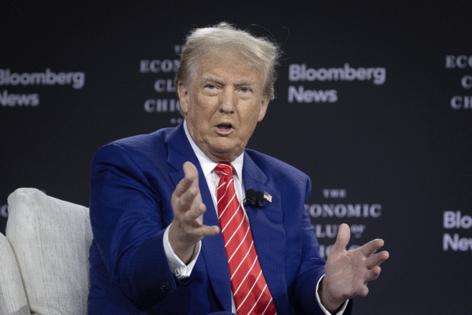Tyler Cowen: Trump's case for tariffs is unusual and unconvincing
Published in Op Eds
In his interview this week with John Micklethwait, editor-in-chief of Bloomberg News, former President Donald Trump offered a somewhat unusual argument in favor of tariffs, which he called “the most beautiful word in the dictionary.” Tariffs, he suggested, are not mainly about protecting domestic industry. Rather, they may serve as a means of luring foreign direct investment to the U.S.
Yet this defense of tariffs also falls short.
In fairness to Trump, there have been times when that strategy has worked, at least partially. In the 1980s, the U.S. took a tough protectionist line on Japanese automobile imports and demanded “voluntary” quotas. The major Japanese automakers, to ensure their longer-term access to the U.S. market, set up auto production plants in the U.S., including in Kentucky and Tennessee. Japanese workers were worse off, and the auto restrictions may have cost American consumers $5 billion a year, but the U.S. did attract more foreign investment.
As a more general strategy, however, this is a risky and ill-advised approach.
In the debates over Brexit almost a decade ago, it was periodically suggested that Britain’s higher trade barriers with the EU could lead to a beneficial upsurge in foreign direct investment, to serve the British market. So far Britain continues to languish in stagnation, and foreign direct investment into the country has fallen. To the extent a nation is not part of the world’s free-trade system, it may be less desirable to invest there.
Now consider the U.S. It is a much bigger market than Britain, yet a Trumpian trade war will not in every way reassure foreign investors. “America First” is a big part of the core Trump message, and foreign investors may fear their longer-term rights will not be fully respected under such a regime. In contrast, Ronald Reagan’s threat to Japanese automakers four decades ago was one small part of a broader commitment to the U.S. as a (mostly) free-trading nation.
Trump, it is fair to say, does not share that commitment. Under Trump’s plans for tariff hikes, the U.S. would repudiate all of its previous trade agreements, including with neighbors and major trade partners Canada and Mexico. Would anyone be surprised if Trump’s next step was to impose a higher corporate tax rate on foreign-owned capital in the U.S.?
Countries that have been successful at attracting foreign capital, such as Singapore and Ireland, have tended to follow a similar strategy: They are credible, predictable and keep their word.
If the U.S. puts tariffs on imports, including imports from its allies, it can expect many of those allies to retaliate with tariffs of their own. That means a foreign plant in the U.S. would be at a disadvantage when selling abroad. Companies might do better putting a plant in Canada, from which they could export more freely to Mexico and the European Union, not to mention Asia and other parts of the world.
Such factors blunt America’s ability to attract foreign direct investment through higher tariff rates. The U.S. domestic market is important, but it is not everything.
Beyond the strategic concerns, there is a huge gaping hole in the economic logic of Trump’s plan. He sees much of trade as a zero-sum mercantilist game: Imports are bad, exports good. Assume for the sake of argument that this is true. Now assume that the U.S. comes up with some policy to attract more foreign direct investment — whether tariffs or something else.
What would happen to the value of the dollar? It would go up, due to the new capital inflows. What then would happen to U.S. imports from abroad? Well, they would be cheaper, so they would go up too. And what would happen with exports? The more valuable dollar would penalize them on world markets, and they would decline.
Lesson: A single-minded obsession with foreign direct investment will hurt your country’s trade balance.
Trump wants to have it both ways. He wants more capital inflow as well as a greater inflow from export revenue. Yet international accounts must balance. As it now stands, the U.S. is very good at attracting capital from abroad, and that capital helps to finance its trade deficit on the side of goods and services, thus balancing out an equilibrium. Higher net exports and higher net capital inflow, in tandem, aren’t going to just happen — and it’s foolhardy to expect that they will.
I’ve said it before, but it bears repeating: Protectionists get a lot of things wrong about free trade.
____
This column does not necessarily reflect the opinion of the editorial board or Bloomberg LP and its owners.
Tyler Cowen is a Bloomberg Opinion columnist, a professor of economics at George Mason University and host of the Marginal Revolution blog.
©2024 Bloomberg L.P. Visit bloomberg.com/opinion. Distributed by Tribune Content Agency, LLC.




























































Comments